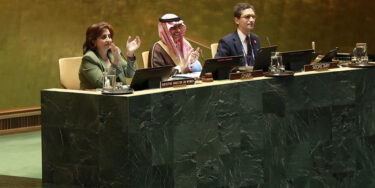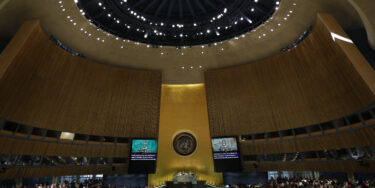LBT Women’s Economic Empowerment: Reflections on the Successes and Struggles from the CSW
20.03.17
(Economic Rights / Human Rights Bodies / Sexual Orientation and Gender Identity)
As week one of the 61st UN Commission on the Status of Women (CSW) draws to a close here in New York, a wide range of LBT activists, researchers and governments have reflected on how or whether this annual UN conference can address the struggles facing LBT individuals, especially in relation to this year’s priority theme, “women’s economic empowerment in the changing world of work.”
By Erin Aylward
This year’s CSW appears to reflect a particularly hostile atmosphere to LGBTI rights: the United States has included representatives of two organizations known to oppose the UN human rights system, LGBTI rights, and women’s sexual and reproductive health and rights in its official delegation; human rights defenders from the six countries targeted in the travel ban have been denied visas and thus the opportunity to be heard during this year’s CSW; and US State Department staffers have been instructed to seek cuts of over 50% in funding for UN programs. Undeniably, we have entered troubling and uncertain times in international relations and human rights advocacy.
Yet, alongside these alarming developments in the international arena, substantive achievements in advancing the rights of LBT individuals around the world have been gained since last year’s CSW. In recognition of the need to celebrate the victories that have forged while also reflecting on the outstanding challenges, ARC International, in partnership with the Canadian government and the Permanent Mission of the Argentine Republic to the United Nations, hosted a side event on March 13 that sought to shed light on the successes and barriers to LBT women’s economic empowerment.
For decades, LGBTI activists from around the world have emphasized that advancing the civil/political rights of their communities only matters as much as access to economic rights and opportunities. As Raphael Crowe (event moderator and ILO senior gender specialist) noted, these comments are borne out by what preliminary data exists: the ILO’s PRIDE Project found that, in each of the nine countries that were studied2, LGBT workers face discrimination on the basis of sexual orientation and/or gender identity throughout their schooling, in accessing employment, and throughout the employment cycle.
Yet, notwithstanding the numerous challenges facing LBT women’s ability to access economic empowerment, this panel also highlighted some encouraging successes and best practices that civil society and government alike have helped to forge. Argentine Ambassador Martín García Moritán noted that states have a responsibility to address LBT employment discrimination. For Argentina, this has ranged from reforms in the education system to developing workshops with the Ministry of Labour and Employment and the private sector to help bridge the employment gap for trans individuals.
This year’s Commission on the Status of Women does not reflect a particularly favourable environment for LBT and women’s human rights defenders. It is clear that, at the international level, previous gains will have to be defended and the shrinking of space for civil society has to be actively resisted against. Yet, for those of us who were fortunate to attend this side-event on LBT economic empowerment, it was impossible to not be struck with a sense of hope, conviction, and renewed inspiration to continue with the struggles ahead.




